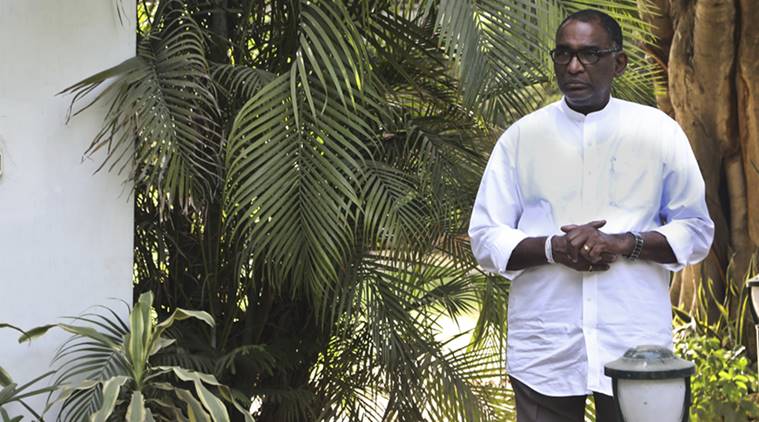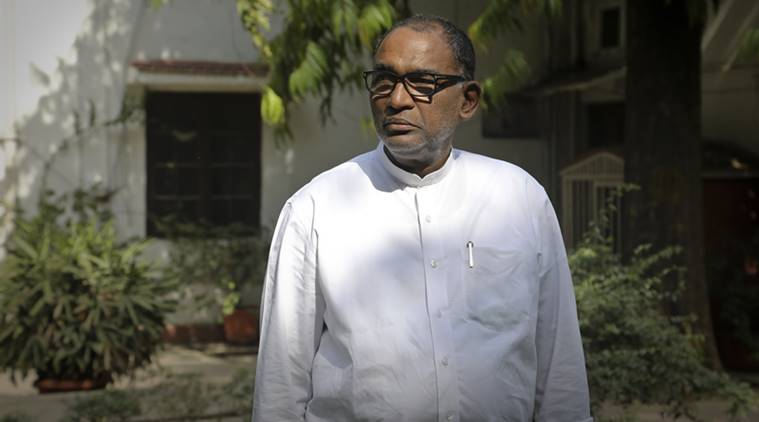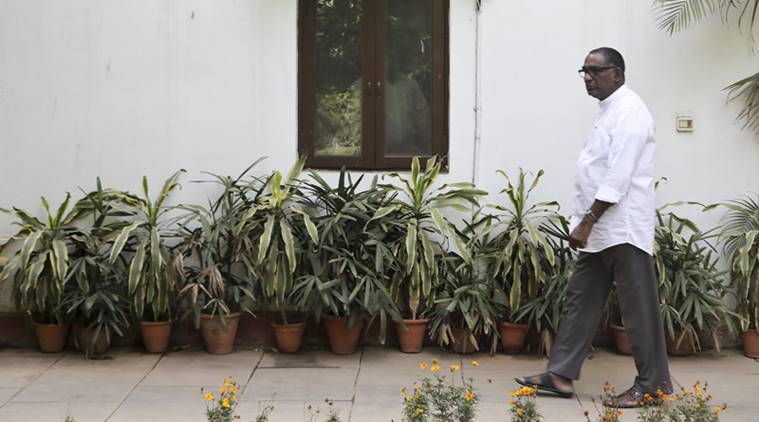 Justice Jasti Chelameswar said, “I define myself as a democrat. I want this country to survive as a democratic society.” (Express photo by Abhinav Saha)
Justice Jasti Chelameswar said, “I define myself as a democrat. I want this country to survive as a democratic society.” (Express photo by Abhinav Saha)
Justice Jasti Chelameswar retired at midnight on Friday after an eventful stint of nearly seven years in the Supreme Court, which started the same day as that of Chief Justice of India (CJI) Deepak Misra. Justice Chelameswar will be remembered for his judgments, as he will be for his outspoken views and often unprecedented actions to assert the independence of the judiciary. He spoke with SUSHANT SINGH on his career, ideas and future plans. Excerpts:
Now that you are retired, how do you now look back at the unprecedented press conference held on January 12 by you and three other members of the Supreme Court Collegium?
I do not find anything wrong with the press conference. I never thought so. Otherwise, I would not have participated in the press conference. Please remember it is not I alone. There were three other senior-most judges of the Supreme Court who participated in the press conference.
After the press conference, many people called you a rebel, others have called you a disruptor. How do you define yourself?
I define myself as a democrat. I want this country to survive as a democratic society. The choice of words is up to an individual — some called me a rebel, others called me a disruptor, some called me a Communist, and some even called me anti-national. I owed a duty to the people of this nation. I believe that without an independent judiciary, no democracy can survive. When we held the press conference, we believed that there is a threat to the independence of the judiciary and we thought that one way is to keep the nation informed.
I acted according to the dictates of my conscience. It is for the civil society and future generations to decide whether I was right in my belief and action.
None of us was looking for any personal gain. Speaking for myself, I have antagonised a lot of people. Some of my colleagues and peers became very formal with me after the press conference. I incurred the wrath of ‘one crore-a-day lawyer’. What have we gained out of it? I was conscious of the fact that each one of these things was likely to happen as a consequence of press conference.
Nevertheless, I and my three colleagues decided to hold the press conference, as we believed that we owed an obligation to the people.
 Justice Jasti Chelameswar said, “Disagreement should not be misconstrued or taken as an adversarial stance.” (Express photo by Abhinav Saha)
Justice Jasti Chelameswar said, “Disagreement should not be misconstrued or taken as an adversarial stance.” (Express photo by Abhinav Saha)
Is the impression right that the relationship between the executive and the judiciary has worsened in the last few years?
I can’t say whether it has worsened or not because I don’t have first-hand knowledge of what was going on earlier. The other day, one of the honourable ministers wrote something about what all wrong things the previous government did, and therefore how right the present government is in some of the actions in dealing with the judiciary. The logic baffles me.
Disagreement should not be misconstrued or taken as an adversarial stance. It is said (that the) Constitution is an intentionally incomplete, and often deliberately open-textured document “for the participatory evolution of democratic practices”. That is the spirit in which all disagreements are required to be viewed.
Any regrets that Justice K M Joseph has not been elevated to Supreme Court so far despite the Collegium’s unanimous recommendation?
It is unfortunate that the matter is still lingering. I believe a man like him should come to the Supreme Court and it will be good for the institution. I still hope that it will happen.
What about fears being expressed that we might see a supersession in the selection of the next CJI?
They are all speculations. I don’t think supersession will happen. I have already spoken about it in detail in my interaction with Karan Thapar at the Harvard event.
You have written to CJIs about the collegium system of appointment of judges, spoken about it, and even gave the NJAC judgment. Is there a golden mean in how judges are appointed, between the pre-collegium method, the collegium, and the NJAC model?
There is nothing called the golden mean, it all depends on bona fides of the actors, both the government and the collegium. If the government had acted bona fide in their part, the Collegium system would not have come into existence. The Second Judges case was a reaction to what the governments had been trying till then. By the time Supreme Court intervened, there were coalition governments and they accepted it.
It is all about the bona fides of the individuals who operate the system. Even the best system can be corrupted and misused. There are equally misjudgments by the collegium. Serious complaints about undesirable recommendations made by the collegium were heard from time to time.
Human beings, either members of the executive or the judiciary, are not saints. A written constitution is a standing testimony to this fact. To make the selection process of judges of constitutional courts consistent with the constitutional spirit, the process should be more transparent to enable the people of this country to understand how the judges are chosen. The best way to bring in such transparency is to record proceedings of the collegium and the reasons for the decision. That is what I have been arguing for. Considerations which are irrelevant in the context of the selection process must be eliminated.
 Justice Jasti Chelameswar said, “Professional success depends basically on the ability of the lawyer.” (Express photo by Abhinav Saha)
Justice Jasti Chelameswar said, “Professional success depends basically on the ability of the lawyer.” (Express photo by Abhinav Saha)
Is there corruption in our judiciary? What about family connections in the judicial fraternity?
Yes, it is there. Why was Justice Quddusi [former Orissa HC judge] arrested? What was the allegation? What else is required to prove that there is corruption? You walk in the corridors of any court, it is spoken openly there.
There are a lot of allegations. I do understand that every allegation need not be true, but when serious allegations are made they are required to be scrutinized dispassionately by some authority to find out the truth of the matter. In my opinion, such a process would really enhance credibility of the system but not brushing aside the allegation without any inquiry.
Professional success depends basically on the ability of the lawyer. It can be achieved by patronage to some extent but that it has its limits. There were sitting judges whose children had roaring practice which vanished immediately after the judge retired. A lawyer with the support of someone from the bench can succeed financially temporarily but it won’t take them far.
Has the quality of bar gone down compared to the past?
The bar can certainly do better.
Has justice become unaffordable for the poor Indian citizen?
The system has problems. A rich man can come to the Supreme Court if he doesn’t get bail in the district court but the poor cannot. Should Supreme Court hear bail applications at all is the question. In my opinion, it should stop at the High Court level. There is a perception that quality of HC is not good, therefore there is a need of Supreme Court to examine every matter. It is very unrealistic state of affairs.
If the quality of the High Court is not good, the quality should be improved. The Supreme Court taking upon the responsibility of correcting every error committed by the High Court does not help.
Many senior advocates believe that Supreme Court is becoming too liberal in entertaining all kinds of petitions. Article 136 was meant to be used as an exceptional jurisdiction, and not for day to day affairs. But then judges invoke it routinely and interference becomes casual.
The jurisdiction of the Supreme Court could be restructured by a constitutional amendment. The current model of 31 judges and 15 benches is faulty, in my view, I dealt with it in my Justice Khanna Memorial Lecture. A better-defined jurisdiction for the court is needed.
Should there be a retirement age of judges, or should it be like in the US? Because we hear a lot about post-retirement employment and its impact on the functioning of the judiciary.
Yes, judges should retire. The use of judges in tribunals etc was to use the experience and quality of their work for public good. But some retired people are recommended for certain posts because of other reasons, as we have seen. It all depends upon bona fides of people making those recommendations.
But you are not taking any post-retirement employment…
Yes, personally I do not want to accept any appointment with the State.
How would you like your tenure at the Supreme Court to be remembered?
My stint at the court, at one level, gave me the great satisfaction. It gave me an opportunity to deal with momentous issues. For example, the NJAC. Leave alone the result and the political logic behind it, of about 250 judges who occupied this court, how many of them got an opportunity to adjudicate upon the constitutional validity of a constitutional amendment? Not even 50, in the last 70 years. I got this big opportunity.
What about future plans? Will you enter politics…write books?
I am not entering electoral politics. I won’t contest elections. Politics in a theoretical sense, watching it, commenting on it, yes I will be interested in it.
There are no plans for memoirs or biography yet but I have agreed to revise a classic book, by B K Mukherjee, a lecture in the Tagore Lecture series on Hindu Religious Endowments. The last edition was done in 1983, and I have agreed to revise it. I also have plans to write a book on select topics of Indian constitution, not a full treatise. I am still planning it.